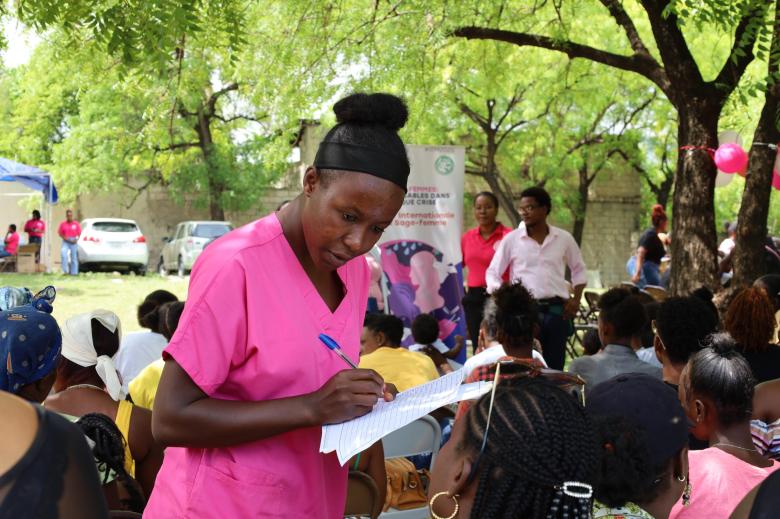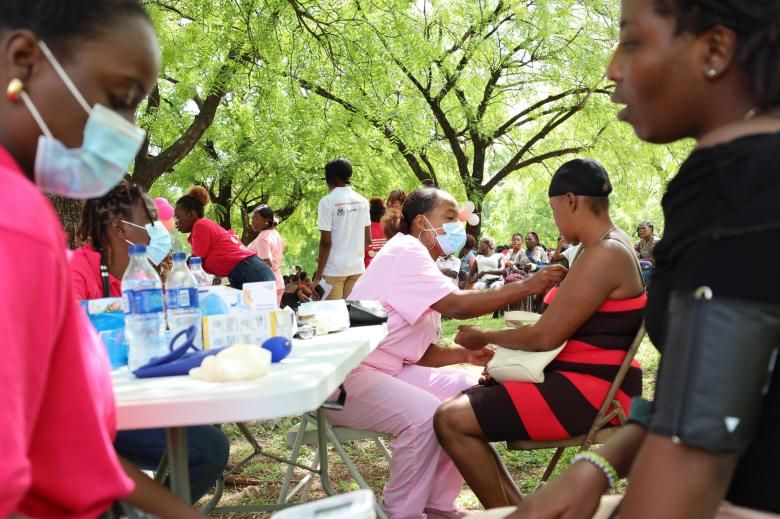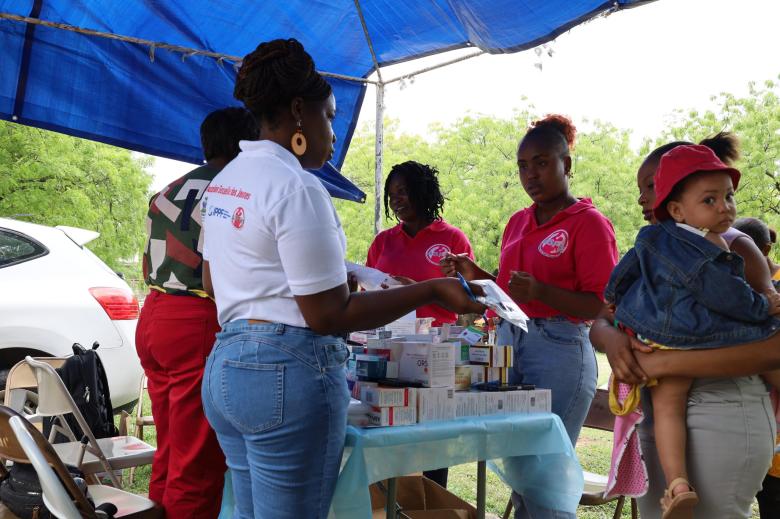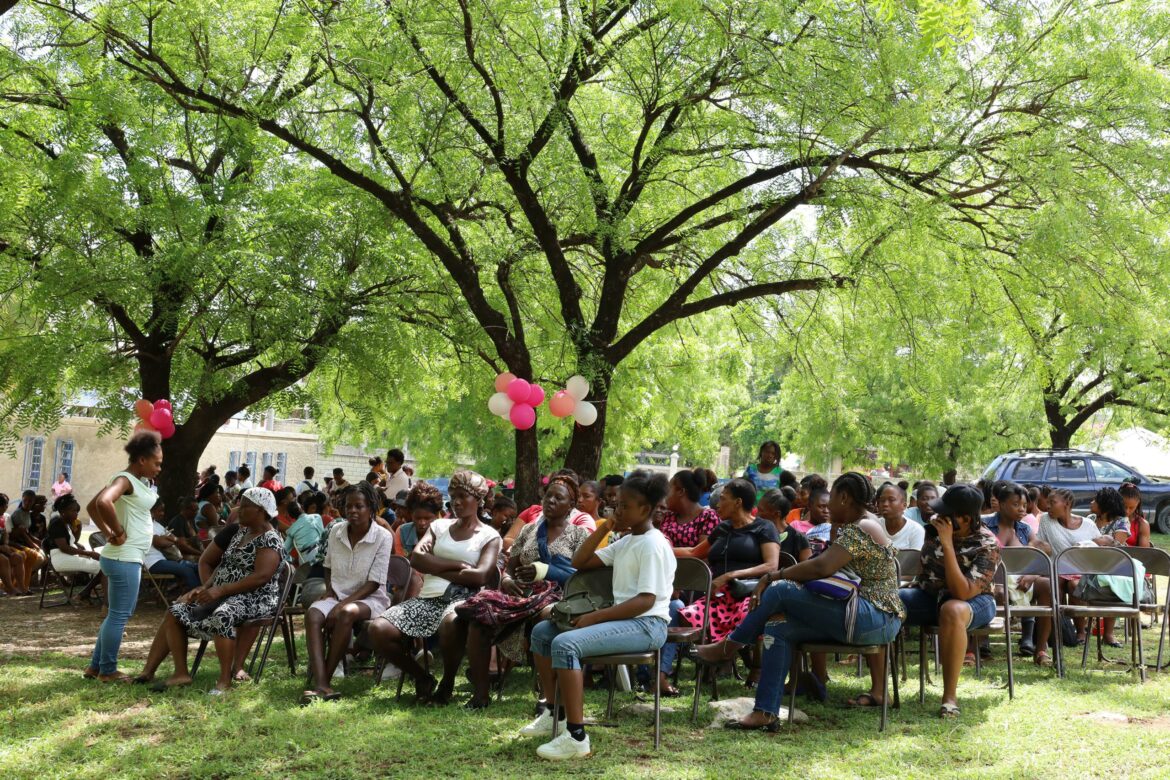Overview:
Within the lead-up to Worldwide Midwives Day, the Haitian Midwives Affiliation organized a cell clinic to help displaced ladies in Port-au-Prince, providing gynecological care, prenatal checkups and psychological assist. The initiative not solely addressed pressing well being wants amidst collapsing healthcare companies and rising gang-fueled insecurity but additionally underscored the important but neglected function of midwives within the nation, the place maternal well being is in disaster and over 1,000,000 individuals have been displaced by gang violence— the bulk are ladies.
PORT-AU-PRINCE — Standing quietly in entrance of the desk of medical provides within the crowded yard of Quisqueya Chapel in Delmas 75, Emanique Monpremier receives sachets of remedy from a workers member of the Haitian Midwives Affiliation (ASFH, per its French acronym). On her left hand, a solid bears witness to the ache of a fracture she sustained whereas dwelling in a refugee camp after fleeing her residence, which was set on fireplace by gangs in Onaville, a locality within the Cul-de-Sac plain— just a few miles northeast of downtown Port-au-Prince.
“The ache is intense, and I usually can’t sleep,” says Monpremier, 41, a mom of two. “My remedy had run out. Issues received worse when my husband additionally had an accident. I’ve to handle the whole lot for my kids, even with this arm.”
Monpremier is one in every of many ladies from numerous age teams who acquired free medical consultations throughout a cell clinic organized by the ASFH on Saturday, Might 3. Amid a collapsing well being system, the ASFH midwives, who usually help ladies in labor, supplied important care to a few of Haiti’s most susceptible ladies, not simply those that are pregnant.
“This exercise is essential to me as a result of the medical care we acquired at present without cost may value us some huge cash elsewhere.”
Ludgmie Fils-Aimé, a displaced lady
Like many others displaced by gang violence, her kids are now not at school. She survives thanks to assist from non-governmental organizations, associations like ASFH, and some good Samaritans. She additionally faces the fixed menace of illness as she endures rain, mud and bugs within the camp’s unsanitary situations.
“I’m dwelling in horrible situations right here. We will’t discover meals, and the rain is our largest downside as a result of we sleep on cardboard,” Monpremier informed The Haitian Instances, calling for monetary assist to lease a spot and begin a small enterprise.
“I’m actually unhappy that I can’t proceed to assist my boys’ schooling. They’re struggling rather a lot by my facet,” she added.
The vast majority of people displaced by gang violence are ladies, accounting for 55% of the whole. By the tip of 2024, Haiti had roughly 1,041,000 internally displaced individuals, with 87% residing within the metropolitan space of Port-au-Prince, in keeping with an OIM report. This represents a major deterioration, because the variety of displaced people has tripled in only one yr, growing from 315,000 in December 2023 to over a million.
As well as, between January and December 2024, a complete of 6,488 instances of gender-based violence (GBV) had been reported by service suppliers throughout the GBV Sub-Cluster, in keeping with the United Nations Growth Programme (UNDP). As 2025 enters its first quarter, ladies like Monpremier proceed to flee their properties, notably from Kenscoff, Delmas 30, Mirebalais and Saut-d’Eau.
Midwives present care as Haiti’s well being system struggles amid insecurity
It’s in such an insecure context—the place every lady carries a heartbreaking but acquainted story—that the Haitian Midwives Affiliation welcomed them on Saturday, Might 3, on the Quisqueya Chapel’s courtyard, an inter-denominational church positioned within the Delmas district. Even when monetary help isn’t obtainable, the affiliation strives to consolation these displaced ladies by offering medical help—a service that has change into more and more uncommon because of the closure and looting of greater than 30 hospitals throughout the nation. This example has made entry to healthcare extraordinarily troublesome.
Based in 2004, the affiliation determined this yr to convey these ladies collectively for a day of devoted medical consultations. Gynecological exams, prenatal checkups, take care of moms and their infants, cervical most cancers screening, psychological assist for survivors of gender-based violence, and drugs to ease their struggling had been all a part of the companies supplied.

Unsurprisingly, they arrived in giant numbers. Gathered within the chapel courtyard, that they had been ready since 8 a.m., hoping to seek out some aid for his or her ache—and that of their kids.
“We need to mark Worldwide Midwives Day by providing free healthcare companies, given the present scenario within the nation the place entry to sexual, reproductive, and maternal well being has change into more and more restricted,” mentioned Jeffthanie Mathurin, communication officer for ASFH.
“We all know the issues are many, however it was necessary to fulfill with these ladies, to allow them to know that midwives are considering of them and that we’re prepared to assist nonetheless we are able to,” she added.
This yr, the affiliation organized a cell clinic as an alternative of internet hosting a day of reflection on the midwifery career. Nevertheless, this isn’t its first initiative of this sort. It has already supplied healthcare companies in quite a few Port-au-Prince camps, together with Maïs Gaté, Bourdon and Clercine.

The initiative was significantly appreciated by the displaced ladies, particularly by Ludgmie Fils-Aimé, who got here particularly for a gynecological session.
“I’m very completely happy about this occasion, and I really feel seen within the assist given to us, ladies,” mentioned Fils-Aimé. “This exercise is essential to me as a result of the medical care we acquired at present without cost may value us some huge cash elsewhere.”
Fils-Aimé fled her residence in Delmas 18 earlier than gangs took management of the world. She now lives with out her husband and along with her younger daughter in a refugee camp arrange on the République d’Équateur college. Like Monpremier, life within the camp is extraordinarily troublesome for her. Surviving away from residence stays a every day wrestle.
“I’m dwelling in horrible situations right here. We will’t discover meals, and the rain is our largest downside as a result of we sleep on cardboard.”
Emanique Monpremier, a 41-year-old displaced mom
“I can’t say I’m dwelling effectively, as a result of I wasn’t on this deplorable scenario earlier than,” says Fils-Aimé, hurrying into the session room.
Midwifery is a comparatively obscure career in Haiti
Past its life-saving medical contribution, this initiative highlights the essential function of midwives in Haiti, a rustic dealing with a maternal well being disaster.
In accordance with Mathurin, there are solely round 250 midwives throughout the nation. Till not too long ago, solely two establishments supplied coaching on this subject. The Nationwide College for Midwives and Nurses (ENISF), based in 1977, has since closed, leaving the Nationwide Larger Institute for Midwifery Coaching (INSFSF), which opened in 2011, as the one energetic establishment to supply coaching and schooling within the subject.

It was solely in 2021 that the career was formally built-in into the State College of Haiti (UEH) via the creation of the College of Midwifery, which gives a decentralized coaching program throughout three websites within the West, North and South departments. In Port-au-Prince, no new recruitment is at the moment doable because of the college’s services having been burned down by gangs. This system now operates from the premises of an area affiliation.
“We need to mark Worldwide Midwives Day by providing free healthcare companies, as entry to sexual, reproductive, and maternal well being has change into more and more restricted within the present scenario within the nation.”
Jeffthanie Mathurin of the Affiliation of Midwives of Haiti
“Sadly, the career stays largely unknown in Haiti, regardless of its international significance in sexual and reproductive well being,” laments Mathurin. “We are sometimes mistaken for fanm chay [traditional birth attendant, typically a woman, who assists with childbirth in the home] or nurses.”
“We give attention to the physiological features of childbirth, and what units us aside from the fanm chay is that we have now acquired scientific coaching formally acknowledged by the state,” she provides, advocating for collaboration between licensed midwives and fanm chay, who help ladies in provincial cities giving start with out formal coaching.

